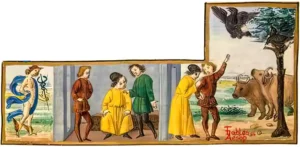Mercury wanted to test Tiresias; he stole some of Tiresias’ oxen and then went to him in human form. Tiresias predicted Mercury could help recover the oxen.
Vanity lives with fortune-tellers.

L’Estrange version
Mercury had a great mind to try if Tiresias was so famous a diviner as the world took him for, or not. So he went and stole Tiresias’s oxen; and order’d the matter to be in the company with Tiresias, as upon bus’ness by the by, when the news should be brought him of the loss of his oxen. Mercury went to Tiresias in the shape of a man, and the tidings came as Mercury had contriv’d it: upon this, he took Mercury up to a high tower, hard by, and bad him look well about him, and ten him what birds he saw. Why, says Mercury, I see an eagle upon wing there, that takes her course from the right-hand to the left. That eagle (says Tiresias) is nothing to our purpose; wherefore pray look again once. Mercury stood gazing a while, and then told Tiresias of a crow he had discover’d upon a tree, that was one while looking up into the air, and another while down towards the ground: That’s enough; (says Tiresias) for this motion of the crow, is as much as to say, I do appeal to heaven, and to earth, that the man that is now with Tiresias, can help him to his oxen again if he pleases.
Moral
This fable is of a general application to all bold and crafty thieves and impostors. It serves also to set forth the vanity of wizzards, fortune-tellers, and the like.
[Note: In Greek mythology, Tiresias was a blind prophet of Thebes, famous for clairvoyance and for being transformed into a woman for seven years. He was the son of the shepherd Everes and the nymph Chariclo. Tiresias participated fully in seven generations at Thebes, beginning as adviser to Cadmus himself. (Wikipedia)]

Gherardo Image from 1480

Mercurius et Tiresias
Mercurius, scire volens an Tiresiae vaticinandi ars vera esset, ruri boves eius furatus, et urbem, formam hominis gerens, ingressus, apud illum hospitii causa divertit. Cum interim amissos fuisse boves Tiresiae nuntiatum esset, ipse statim, aliquod de fure augurium capturus, Mercurio comite, domo egreditur eumque simul rogat ut, si quam avem praetervolantem videret, admoneat. Mercurius igitur aquilam primum a sinistra ad dexteram devolantem observasse se ait, sed Tiresias nihil eam sua interesse respondit. Deinde Mercurius cornicem in arbore insidentem adspexit quae oculos modo in caelum elevabat, modo humi vertebat; idque simul vati indicavit. Qui, statim respondens, “Mehercle, ista cornix,” ait, “per caelum terramque iurans, affirmat quod, si tu velis, amissos boves recepero.”
Perry #089
